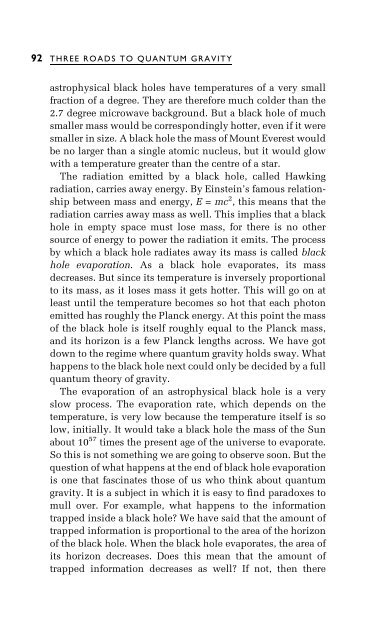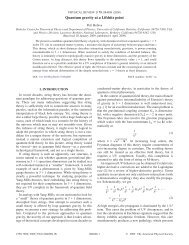Three Roads To Quantum Gravity
Three Roads To Quantum Gravity
Three Roads To Quantum Gravity
You also want an ePaper? Increase the reach of your titles
YUMPU automatically turns print PDFs into web optimized ePapers that Google loves.
92 THREE ROADS TO QUANTUM GRAVITY<br />
astrophysical black holes have temperatures of a very small<br />
fraction of a degree. They are therefore much colder than the<br />
2.7 degree microwave background. But a black hole of much<br />
smaller mass would be correspondingly hotter, even if it were<br />
smaller in size. A black hole the mass of Mount Everest would<br />
be no larger than a single atomic nucleus, but it would glow<br />
with a temperature greater than the centre of a star.<br />
The radiation emitted by a black hole, called Hawking<br />
radiation, carries away energy. By Einstein's famous relationship<br />
between mass and energy, E = mc 2 , this means that the<br />
radiation carries away mass as well. This implies that a black<br />
hole in empty space must lose mass, for there is no other<br />
source of energy to power the radiation it emits. The process<br />
by which a black hole radiates away its mass is called black<br />
hole evaporation. As a black hole evaporates, its mass<br />
decreases. But since its temperature is inversely proportional<br />
to its mass, as it loses mass it gets hotter. This will go on at<br />
least until the temperature becomes so hot that each photon<br />
emitted has roughly the Planck energy. At this point the mass<br />
of the black hole is itself roughly equal to the Planck mass,<br />
and its horizon is a few Planck lengths across. We have got<br />
down to the regime where quantum gravity holds sway. What<br />
happens to the black hole next could only be decided by a full<br />
quantum theory of gravity.<br />
The evaporation of an astrophysical black hole is a very<br />
slow process. The evaporation rate, which depends on the<br />
temperature, is very low because the temperature itself is so<br />
low, initially. It would take a black hole the mass of the Sun<br />
about 10 57 times the present age of the universe to evaporate.<br />
So this is not something we are going to observe soon. But the<br />
question of what happens at the end of black hole evaporation<br />
is one that fascinates those of us who think about quantum<br />
gravity. It is a subject in which it is easy to ®nd paradoxes to<br />
mull over. For example, what happens to the information<br />
trapped inside a black hole? We have said that the amount of<br />
trapped information is proportional to the area of the horizon<br />
of the black hole. When the black hole evaporates, the area of<br />
its horizon decreases. Does this mean that the amount of<br />
trapped information decreases as well? If not, then there



![arXiv:1001.0993v1 [hep-ph] 6 Jan 2010](https://img.yumpu.com/51282177/1/190x245/arxiv10010993v1-hep-ph-6-jan-2010.jpg?quality=85)


![arXiv:1008.3907v2 [astro-ph.CO] 1 Nov 2011](https://img.yumpu.com/48909562/1/190x245/arxiv10083907v2-astro-phco-1-nov-2011.jpg?quality=85)








![arXiv:1002.4928v1 [gr-qc] 26 Feb 2010](https://img.yumpu.com/41209516/1/190x245/arxiv10024928v1-gr-qc-26-feb-2010.jpg?quality=85)
![arXiv:1206.2653v1 [astro-ph.CO] 12 Jun 2012](https://img.yumpu.com/39510078/1/190x245/arxiv12062653v1-astro-phco-12-jun-2012.jpg?quality=85)
